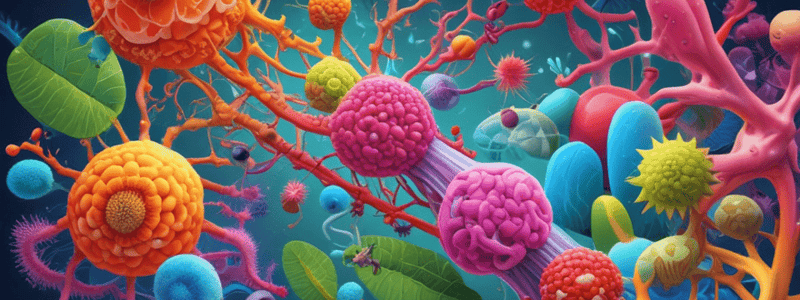Podcast
Questions and Answers
What is the branch of science concerned with understanding living organisms and their interactions?
What is the branch of science concerned with understanding living organisms and their interactions?
- Geology
- Chemistry
- Astronomy
- Biology (correct)
What is the approximate percentage of DNA sequence identity shared between humans and chimpanzees?
What is the approximate percentage of DNA sequence identity shared between humans and chimpanzees?
- 80% (correct)
- 60%
- 95%
- 70%
Which process involves converting food into energy within cells?
Which process involves converting food into energy within cells?
- Mitosis
- Cellular respiration (correct)
- Cell division
- Photosynthesis
When did humans evolve from a common ancestor with chimpanzees and bonobos?
When did humans evolve from a common ancestor with chimpanzees and bonobos?
What are the four stages of cellular respiration?
What are the four stages of cellular respiration?
Which field of bioscience focuses on designing new biological systems for specific purposes?
Which field of bioscience focuses on designing new biological systems for specific purposes?
Which field of biology studies inheritance patterns and traits variation?
Which field of biology studies inheritance patterns and traits variation?
What does bioinformatics primarily use to analyze and interpret biological data?
What does bioinformatics primarily use to analyze and interpret biological data?
What explains how species change over time through processes like natural selection?
What explains how species change over time through processes like natural selection?
What does ecological restoration aim to improve in ecosystems?
What does ecological restoration aim to improve in ecosystems?
Which stage in cellular respiration involves the breakdown of glucose?
Which stage in cellular respiration involves the breakdown of glucose?
What is the primary focus of astrobiology research?
What is the primary focus of astrobiology research?
Flashcards are hidden until you start studying
Study Notes
Biology
Biology is the branch of science concerned with the understanding of living organisms and their interactions with each other and their environments. It involves the study of various aspects of life, including molecular biology, developmental biology, genetics, ecology, and evolution.
Introduction to Biology
Biology is a broad field that encompasses various disciplines such as microbiology, molecular biology, developmental biology, physiology, genetics, ecology, systematics, behavior and ethology, neuroscience, paleontology, anatomy, and biochemistry. It seeks to understand the fundamental processes of life, from the cellular level up to entire ecosystems.
Cellular Respiration
Cellular respiration is the process by which organisms convert food into energy in order to carry out their daily functions. This process occurs within cells and consists of four stages: glycolysis (the breakdown of glucose), the citric acid cycle (also known as the Krebs cycle), the electron transport chain, and oxidative phosphorylation.
Genetics and Evolution
Genetics studies the inheritance patterns and variation of traits among individuals within species. The theory of evolution explains how species change over time through natural selection, genetic drift, gene flow, and mutation. Evolution has been supported by numerous lines of evidence including fossils, comparative anatomy, DNA sequence similarities, and computer modeling.
Human Evolution
Humans are part of the primate family and share about 90% DNA sequence identity with our closest living relatives like chimpanzees and bonobos. Humans evolved from a common ancestor with these species around six million years ago. Our unique characteristics have developed since then due to genetic changes, or alleles, that gradually became more frequent in human populations over generations.
Modern Trends in Biology
Today's bioscience research covers a wide range of topics, from understanding basic biological processes at the molecular scale to large-scale environmental issues. Some current areas of interest include:
- Synthetic biology: An engineering approach to designing new biological systems or modifying existing ones for specific purposes, often using techniques like CRISPR gene editing.
- Bioinformatics: The use of computational tools and methods to analyze and interpret biological data, particularly in the context of genomics and proteomics.
- Neuroscience: The study of the nervous system, including brain function, neural coding, behavior, cognition, and psychiatry.
- Ecological restoration: Efforts to restore degraded or disturbed ecosystems to improve their resilience and biodiversity.
- Astrobiology: The search for signs of past or present life beyond Earth, as well as studying the origins of life on our planet.
Studying That Suits You
Use AI to generate personalized quizzes and flashcards to suit your learning preferences.





